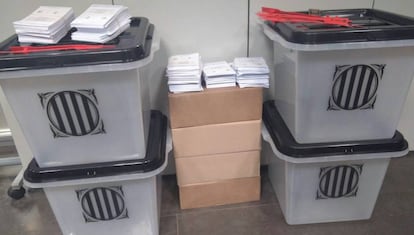Ballot boxes: Catalonia’s best-kept secret
Thousands of people in region coordinated activities to ensure equipment got to polling stations
For many days it was the best-kept secret in every town and neighborhood of Catalonia. As tensions grew leading up to the illegal independence referendum, small groups of people worked in secret to get the 10,000 ballot boxes and millions of ballots to the regional government’s 2,315 designated polling stations. This was a complex logistical operation that, despite the efforts of thousands of police officers to shut it down, was completed with great precision.

“It was a colossal job, only possible thanks to thousands of anonymous people,” says a person who participated in the preparations in Catalonia’s Tarragona province. “Everyone knew what they had to do and preferred not to know about everything else. At first it was almost fun, but as the day drew near and everything became tense, you became a bundle of nerves. You couldn’t share it with anyone, not even with your partner,” the person added.
Ordering, receiving, and storing 10,000 ballot boxes was challenging. If we were caught, there was no plan B A Catalan mayor
The purchase of the ballot boxes was perhaps the most important part of the whole operation. “With the ballots there was more wiggle room. They could be printed at multiple sites and on multiple dates. But ordering 10,000 ballot boxes, receiving them, storing them, and distributing them was more challenging. If we were caught, there was no plan B,” says a mayor of a town on the Mediterranean coast near the city of Girona. “I myself have no idea, nor did I want to know, who took care of it. But it wasn’t more than five or six people.”
The boxes were bought from China Smart Dragon Ballot Expert, which sent them to the town of Elna, in French Catalonia near the border, according to Catalan news site Ara. From there, they were brought into Spain by van. The secrecy, and the small number of people who participated in this phase of the operation, prevented details of how they bought and distributed the items from spreading.
“I did not know, nor wanted to know, anything about the ballot boxes,” says a mayor from the Moianès area, north of Barcelona. “We all knew there was a coordinator and we let that person do their job. The only thing I was told was to stay calm, that [the boxes] would arrive on time,” he continued. “People might have had their phones tapped, so no one spoke over the phone or sent messages. Everything was done in person.”
The boxes passed from trunk to trunk until they reached the school A councilor from Bages
Another councilor from the neighboring district of Bages in central Catalonia explains that he did not know how the boxes would arrive “until a meeting at 9pm on Saturday night. Later I found out [how it worked]. In the town we had three polling stations with 10 ballot boxes and each location had a point person, with a fourth person to coordinate,” he explained.
It was the latter who received the call to “go to a meeting point between 12 and 1am,” the councilor said.
“They asked him not to go with his car, but with a friend’s. There, they were given the ballot boxes and they were kept in the trunk all night. Then, between 5 and 7am, he met with those responsible for each polling stations. They were transported one by one in discreet places. The boxes were passed from trunk to trunk until they reached the school,” he added.
In many other cases, the ballot boxes arrived in the municipalities days before the vote and were kept in all sorts of places: workshops, homes, cars, and churches. “I received the ballot boxes last Wednesday. A person from the party called me and asked if I would be home that afternoon. It was the signal,” explained the mayor of Empordà, in northern Catalonia. “I took two to the attic and I kept another one in a room. The worst moment was when I saw my daughter, who is eight years old. I had to turn to the poor girl and say seriously, ‘You didn’t see anything’.”
Also in Empordà, another mayor had a scare when traveling in the van loaded with referendum material. Two Civil Guard officers approached his vehicle: “It was the worst moment of his life,” recalls a colleague. “In the end, they just asked him how to get to another town and they did not even see what he was carrying. They were just lost and didn’t know the area.”
English version by Debora Almeida.
Tu suscripción se está usando en otro dispositivo
¿Quieres añadir otro usuario a tu suscripción?
Si continúas leyendo en este dispositivo, no se podrá leer en el otro.
FlechaTu suscripción se está usando en otro dispositivo y solo puedes acceder a EL PAÍS desde un dispositivo a la vez.
Si quieres compartir tu cuenta, cambia tu suscripción a la modalidad Premium, así podrás añadir otro usuario. Cada uno accederá con su propia cuenta de email, lo que os permitirá personalizar vuestra experiencia en EL PAÍS.
¿Tienes una suscripción de empresa? Accede aquí para contratar más cuentas.
En el caso de no saber quién está usando tu cuenta, te recomendamos cambiar tu contraseña aquí.
Si decides continuar compartiendo tu cuenta, este mensaje se mostrará en tu dispositivo y en el de la otra persona que está usando tu cuenta de forma indefinida, afectando a tu experiencia de lectura. Puedes consultar aquí los términos y condiciones de la suscripción digital.









































